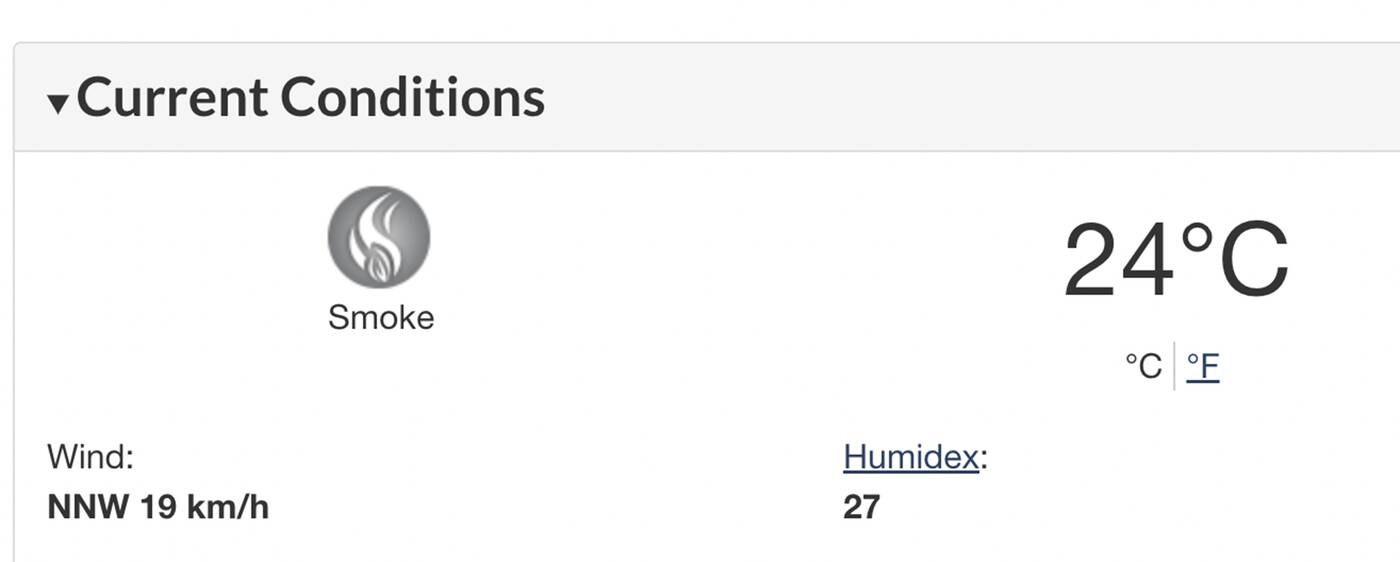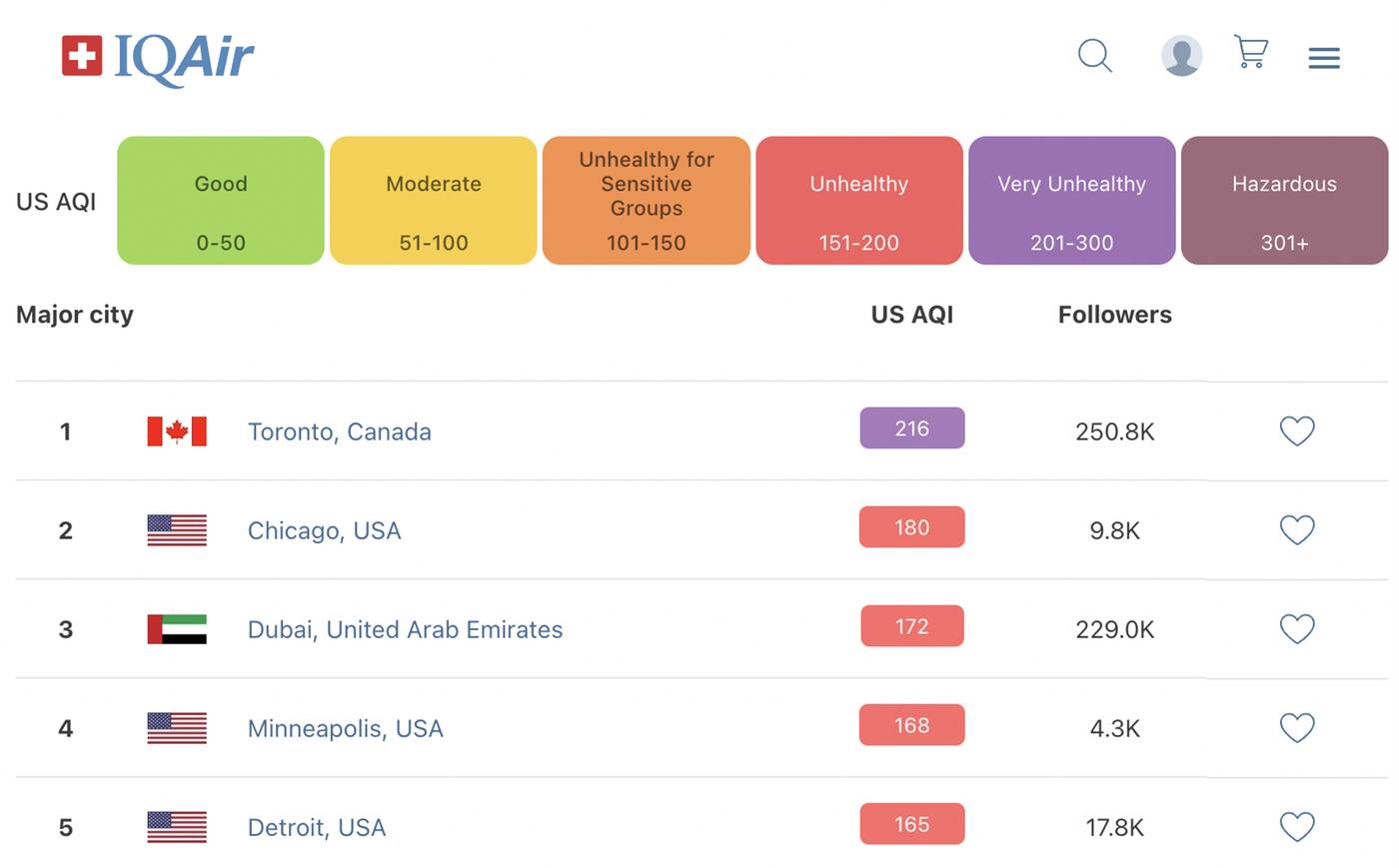
Toronto moves to top spot for worst air quality in the world and the city is struggling
Residents of Toronto are being advised to shut their windows and stay indoors today now that wildfire smoke has returned to suffocate the city, making visibility, air quality and health risks even worse than during the similarly hazy days earlier this month.
Environment Canada describes our current weather conditions as simply "smoke" alongside a special air quality statement calling for "very high levels of pollution" that will continue into tonight, but even the agency may not have been prepared for how bad the atmosphere has deteriorated.
 As of around 3:30 p.m. Wednesday, Toronto has ascended to the top spot on rankings of the worst air quality in the world, beating out cities in India, China, and other places known for pollution.
As of around 3:30 p.m. Wednesday, Toronto has ascended to the top spot on rankings of the worst air quality in the world, beating out cities in India, China, and other places known for pollution.
During the last spate of smoky days, we had made it to third place in the list that absolutely no one should boast about.

According to IQAir, the city is now in "very unhealthy" territory with an air quality index of around 216 at the time of publication.
Other sites are putting parts of T.O. at as high as 289, edging toward downright "hazardous" territory.
So much smoke in the air in Toronto today, almost gagged when I stepped outside just now😷
— aysha⁷ (@kurorosonlyfans) June 28, 2023
Many online are saying that this is by far the most smoke cover they've ever seen in their lives as smoke plumes from the ongoing wildfires in northern Ontario and Quebec are carried over amid Canada's worst wildfire season on record.
To put it into perspective, Canadian wildfires have burned an area measuring more than 100 times the size of Toronto so far this year, while in Quebec specifically, more area has been burned in the last 25 days than in the last 20 years.
Getting the worst smoke we've had so far in Toronto today.
— Iestyn T Harris (@IestynTHarris) June 28, 2023
Stay safe, everyone, don't stay outside too long if you can help it.
"Wildfire smoke can be harmful to everyone’s health even at low concentrations," EnvironCan warned today, telling residents to seek clean, cool air, use HVAC systems and air purifiers to the extent of their abilities, don respirator masks if heading outside and limit outdoor activity.
"Air quality and visibility due to wildfire smoke can fluctuate over short distances and can vary considerably from hour to hour."
Wildfire smoke in Toronto today is next level! @AnthonyFarnell @KelseyMcEwen @CityNatasha pic.twitter.com/PqIbeFnOvV
— Becky White (@Dogs247Becky) June 28, 2023
While vulnerable populations are the most susceptible to adverse health effects like coughing and trouble breathing, burning eyes and throat, chest pain, nausea and more, it seems that everyone in and around the city is feeling (and definitely seeing) the impacts of the dense, particulate-filled air.
The smoke in #Toronto is terrible today. The worst I’ve seen thus far. You can literally taste it… can’t be good for our lungs 😷
— Lucas Di Rocco (@Lucasdirocco) June 28, 2023
Some report feeling sick and gagging from mere minutes outside, where the air has a distinct smell of campfire or even burning plastic, along with a nasty taste.
According to The Weather Network, the more potent smoke we are experiencing today is not just comprised of volatile organic compounds from the infernos, but also toxic chemicals like benzene and formaldehyde compounds that are formed as the smoke interacts with UV rays in the atmosphere.
What the Toronto skyline usually looks like, and what it looks like today. #onwx #smoke https://t.co/mAcmbXn08h
— Lyndsay Morrison (@Lyndsay_CTV) June 28, 2023
Of course, astounding, apocalyptic-looking photos of the city's skyline abound on social media, with many claiming they can't even spot giant landmarks like the CN Tower or other parts of their usual view despite being in close proximity.
Toronto is a smoke show you can barely see the CN Tower! pic.twitter.com/nJxCNuT1gj
— Lola Champagne 🥂✨ (@FlyLadyDi) June 28, 2023
Citizens can track the smoke on interactive maps online as the conditions continue to fluctuate.
Latest Videos
Latest Videos
Join the conversation Load comments







